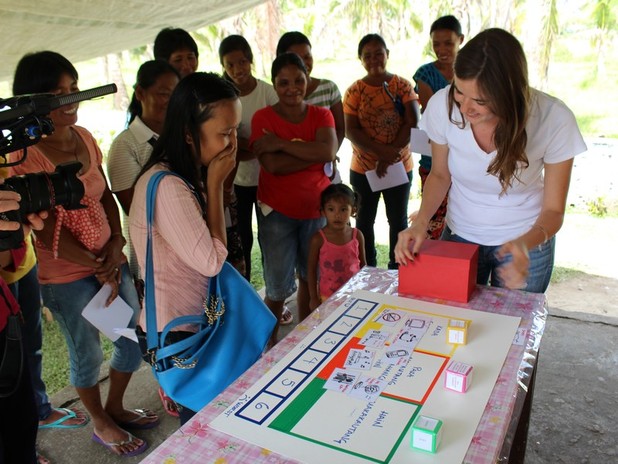May 06, 2014
Partnering with Mercy Corps and mobile-banking institution BPI Globe BanKO, the IDEO.org design team arrived to the Philippines to better understand how to bring financial stability to communities affected by Typhoon Yolanda through the use of mobile tools.
When our research began directing us more and more towards loans, we found that we really needed to delve into the loan landscape in rural villages of Leyte, one of the hardest hit communities. We could have just asked people what they think of loans and their previous experiences with them, but we had our doubts if this would give us the information we needed. We really wanted to get more visceral reactions that spoke closer to how they felt about loans and not just what they thought of them.
What We Did
We designed the "Loan Surprise!" game—a board game to create loan scenarios and allow us to get instant reactions, which we then probed deeper on. We set up in an area where we knew we would have a lot of people (of our target demographic). We also had the great advantage of setting up in a place where people were waiting in line for their turn to listen to a seminar, which meant they had time to spare on our game.
What You’ll Need
- A board (to draw the game on)
- Markers & tape (to draw the board)
- 3 big dice
- Flash cards
- A crowd and willing participants
How to Play
Choose someone from the crowd to be your player. The player comes close to the board and shakes the dice up. They roll the dice on the board, with which they will have created their loan scenario. Place each dice in the appropriate color on the board.
Read out the loan to them. For example: "You have landed on a loan [dice 1] from a loan shark, that you need [dice 2] a tax certificate to get and you can pay off [dice 3] whenever you can. Would you take this loan?"
They will either answer enthusiastically yes or no, or hesitate for a moment and wonder maybe. Ask why and engage in conversation. Depending on where the conversation is going and how it’s flowing, feel free to move the dice around until you find an ideal loan scenario for the player. Make sure you understand WHY that's the ideal scenario and not just WHAT it is.
Remember:
- Don't ask leading questions.
- Avoid questions that have yes and no answers.
- Ask why many times and in different ways.
Tips: Any hesitation means there is more to the story. Ask them why they hesitated on something or what caused them to change their mind. The process can be more valuable than the result.
What We Learned
Some of the most interesting conversations from this exercise were about loan sharks and the role they play in people's lives. They have such a strong presence in the villages that their loan name, the 5/6 loan, is synonymous with a fear and worry, yet it is available to all.
When emergencies arise and people don't have a friend or relative willing to lend them some money, they have only two options. One is a loan shark, whose barriers to entry are low but they make you work hard for your credit by buying things you don't need, and you must live with the fear of what happens when you can't pay. The other option is a bank loan. This option is not accessible to many whose livelihoods have been compromised with the storm and don't have a way to prove that they have a fruitful business at the moment.
Our learnings also included how people interpret the barriers of entry to getting a loan, the right repayment schedule for these particular communities, the value of community service as a valid form of payment (it's not punishment when it represents working for your money), and exploring other recurring themes such as trust, shame, and reputation.
Why It Counts
Understanding how people feel about loans is more valuable than understanding what the actual loan structure is. The “Loan Surprise!” game allowed us to understand the underlying emotions associated with loans, independent of the technical details, which in turn means that our new product can directly address some of these fears.
If we were to ask these questions directly, we would likely talk about interest rates and payback terms. But by creating scenarios we can dive deeper into how people perceive loans. They are more likely to talk about what fears they have if they can't pay back, their relationship with their family and why they would or would not take loans from them, and even share personal experiences if they are comfortable. The game aspect of it makes it fun and entertaining not just for them, but for the interested crowd that gathers around the table. Don't be afraid to include other people from the crowd if they are interested, as long as you make sure the topic stays on point.
Have fun! And remember we made this to fit our project. Feel free to change and adapt this game to any other topic that has many variables that add up to one whole model.





